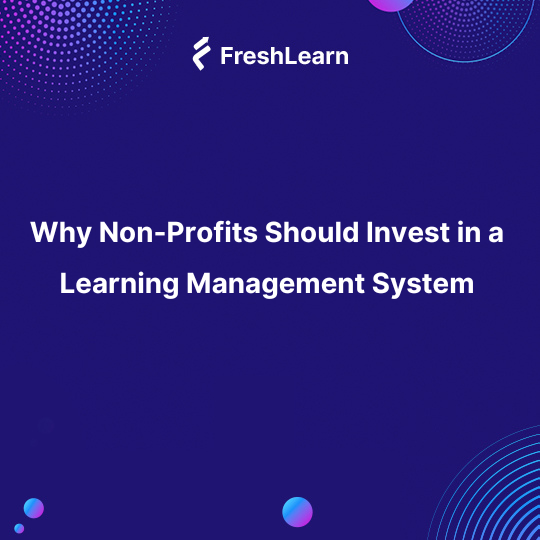
Why Non-Profits Should Invest in a Learning Management System
Many non-profit organizations that are transitioning from traditional to online training are opting for learning management systems, like FreshLearn. | LM
There is more happiness in giving than receiving. Non-profit organizations embrace this thought and turn it into reality with the Learning Management System.
Non-profits, the world over, are an important pillar of a democratic society. They underline the importance of building civil society and giving back to the community. Working with non-profit organizations is a rewarding experience for everyone involved, as they’re able to contribute meaningfully to society, uplift the underprivileged and invest in the future of the world.
When non-profit organizations scale, they work like any big conglomerate. For instance, they comprise employees with diverse skill sets – be they volunteers, executives, or board members.
To keep these employees up-skilled and professionally relevant, NGOs need to impart quality training programs as much as any profit-making enterprise does. A well-trained team ensures that the non-profit organization runs seamlessly and works without glitches.
When each member of a team understands their job role and responsibilities, it becomes easier to make decisions and helps organizations achieve their targets on time.
Since posting profits and spending excess money on organizational growth is a philosophy that non-profits strictly don’t subscribe to, online teaching platforms like learning management systems are proving to be an efficient and cost-effective medium to impart training and conduct learning modules for employees. These affordable platforms are emerging mediums that are easy to access, and make learning interesting, interactive, and real-time. ing as lear
Learning Management System (LMS): Train Anyone, Anywhere

Non-profit organizations often hire new people and regularly work with volunteers, so automating employee training is one of the best long-term investments they can make. Creating, storing, and distributing the right knowledge is key to an organization’s success. New-age technologies like Learning Management Systems (LMS) have made this task seamless.
Let’s look at how online learning platforms are emerging as a perfect tool for non-profit organizations
1. LMS Allows you to Share Knowledge with Anyone, Anywhere
To be successful, a non-profit organization must create a culture of safe and convenient knowledge sharing. LMS fits perfectly, e-learning platforms are designed to foster training and collaboration. Online learning tools come with various features that promote knowledge sharing
- Social learning features – video conferencing and real-time chats promote peer-to-peer knowledge sharing.
- Collaborative learning features – online communities and customized schedules create a collaborative and knowledge-wealthy company culture.
- Mobile learning features – LMS can save and store course content and can be assessed by employees at any time.
2 . You don’t need to know technology to use a Learning Management System (LMS)
You can be a non-profit organization working in the healthcare, environment, or conflict resolution sector, and you can use online learning platforms without worrying about being a technology novice.
Modern-day learning management systems are Code platforms that don’t require tech know-how to operate. Most platforms are cloud-based and have the look and feel of a regular website, where employees simply log in to join a course. Users can easily create, administer, manage, and analyze courses themselves.
3. Create Customized Courses for Any Geography
Non-profit organizations have to create courses that are relevant to the geographies they work in. The educational requirements of nurses who work with malnourished children in Africa are different from those of medical caregivers working with cancer patients in Europe. LMS allows organizations to create courses for varied skill sets and user types.
4. Leverage Easy-to-Use Tools to Create Interactive Courses
Companies can leverage a range of tools – like high-resolution video and audio conferencing features, texts, quizzes, chat rooms, and live sessions to create interactive and interesting course content.
5. Develop Talent in-House at Minimal Cost and Reduce Training Time
You can devise lessons that are targeted specifically at the skills and knowledge gaps in your employees and create courses so that people can upskill and cross-train. Also, an LMS reduces training time as employees can attend a course whenever it fits into their schedule.
Advantages of Learning Management System (LMS)

Global non-profit organizations today are fast-paced, inter-connected, and work across national borders. This makes LMS a perfect fit for them to train employees working in any remote corner of the world. Let’s look at the other advantages that LMS brings to non-profits
Unifies Your Global Workforce: An LMS makes it easy to deploy localized training materials. You can also incorporate collaborative online training tools for team building, and group collaboration projects that allow your worldwide workforce to solve organizational challenges.
- Cost-Efficient and Hassle-Free Learning Solutions: Online learning platforms remove the requirement for printed materials. Also, companies don’t need to facilitate instructors to travel to remote locations to teach employees. It helps them provide training solutions at minimal costs. Also, courses can be accessed by team members at any time.
- Helps You Customize Your Platform: You can customize your online learning platform to reflect the image of your organization. It has features such as providing certificates after completion of the course, email notifications, or helping a team member to re-certify.
- Manage Content Better: You can simply drag and drop files into your platform. It supports all major file types. You can add an audio file, or video training materials, or offer webinars.
- Track Your Learners: Track the progress of your learners. LMS provides information on whether an employee has undertaken, completed, or cleared a training course, the time taken to complete a course, or the areas your employees found challenging.
- Increases Revenue: By investing in training, a nonprofit can increase its revenue.
- Safe Centralized Storage: Gather all your online training material in one place, where it can be modified by admins and accessed by employees.
Conclusion
Many non-profit organizations that are transitioning from traditional to online training are opting for learning management systems, like FreshLearn.
As most global non-profits work across national boundaries, e-learning platforms are proving to be the perfect training tool for them. Switching to an online learning platform may seem like an unnecessary expense initially, but in the long run, it ends up saving money and makes employee training uncomplicated and easy to customize for any resource in any part of the world.
FreshLearn lets you transform your knowledge into an online school. Start creating your online courses and launch your online academy in less than 60 mins.



